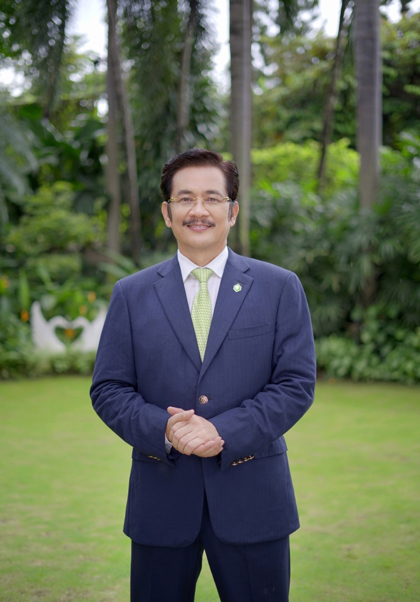
by Editor | Nov 8, 2020 | News
On November 11, 2020, at 07:45 ICT (19:45 EST), Chairman of the Novaland Group Bui Thanh Nhon will meet Governor Michael Dukakis, co-founder and Chairman of Michael Dukakis Institute for Leadership and Innovation, to discuss building AIWS Square, the History of AI House, Michael Dukakis House, Vint Cerf House, and AIWS Leadership Education Program at NovaWorld Phan Thiet, and plan to connect NovaWorld Phan Thiet to the AIWS City in 2021.
Novaland Group has built a World’s Beach City for Wellness, an attractive destination for vacation called NovaWorld Phan Thiet. NovaWorld Phan Thiet is a gem, an urban coastal city, a vacation land and a modern working city with all the requirements to become an ideal destination for world leaders, creators, innovators, and scholars.
Chairman Bui Thanh Nhon said, “We are proud to cooperate with the AIWS City to create NovaWorld Phan Thiet, a city of history, intelligence, and humanity, connecting with other intellectual, cultural and innovative centers around the world, with the standards of the Social Contract in the AI Age, adhering to AIWS City”.
Phan Thiet is a well-known city with blue ocean, white sands, bright sunshine, and modern infrastructure, connecting the region to cities around the world with an international airport, seaports, and highways. Phan Thiet city is also famous for the unique culture and history of the Champa people. Phan Thiet is only 160 km from Ho Chi Minh city, Vietnam. Phan Thiet provides all the conditions to be a world destination. With the available advantages of this city, Novaland Group has built a World’s Beach City for Wellness, an attractive destination for vacation called NovaWorld Phan Thiet.
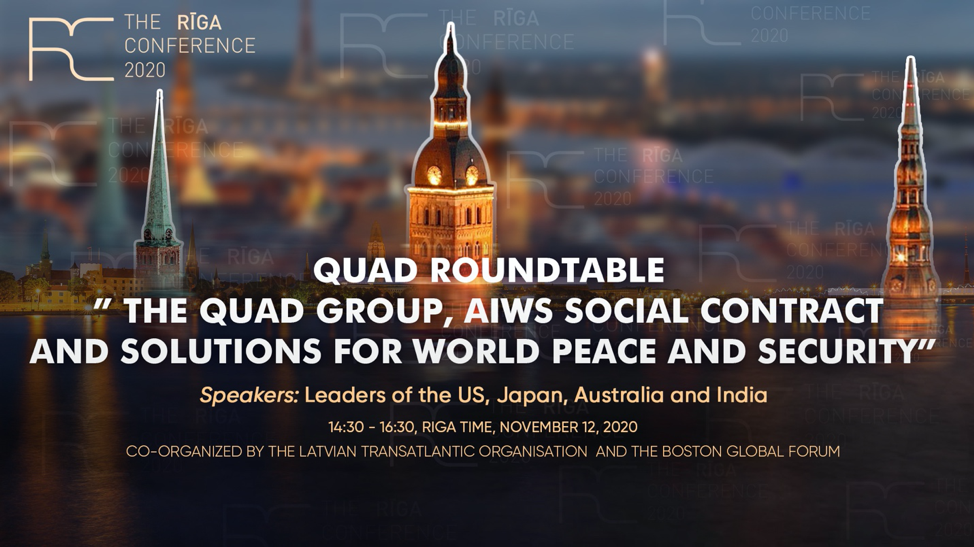
by Editor | Nov 8, 2020 | Event Updates
The Quad Roundtable is a special side event of the Rīga Conference 2020, Session Quad Roundtable” the Quad Group, AIWS Social Contract and solutions for world peace and security”, co-organized by the Latvian Transatlantic Organisation (LATO) and the Boston Global Forum (BGF).
The Quadrilateral Initiative – informally named the Quad – first began in May 2007 with a meeting between the US, Japan, India and Australia in the Philippine capital Manila.
The informal grouping, championed by Japan’s then prime minister Shinzo Abe, was viewed by analysts as an attempt to step up co-operation in the face of a rapidly rising China.
Prime Minister Suga told reporters he would seek to “promote a free and open Indo-Pacific” and also “build stable relations with neighbouring countries including China and Russia”. So when Prime Minister Yoshihide Suga and Secretary of State Mike Pompeo greeted each other in front of a bank of American and Japanese flags on October 6, 2020 in Tokyo, they exchanged what was surely the longest fist bump in their nations’ seven-decade alliance, a nearly 15-second joining of knuckles.
On 16-18, September, the World Leadership Alliance-Club de Madrid and the Boston Global Forum co-organized the Policy Lab “Transatlantic Approaches on Digital Governance: A New Social Contract in the Age of AI”, in which presidents, prime ministers, distinguished thinkers, and scholars discussed the Social Contract for the AI Age, and saw it as significant standards for world politics and economy in the 21st century.
How can the Quad Group support and maintain peace and security? What is the role of each member?
How can the Quad contribute to peace and security in the European, Atlantic, and Baltic regions?
How can democratic governments support and use the Social Contract for the AI Age as standards for international relations and for peace and security?
How can democratic governments recognize and implement the Social Contract for the AI Age?
14:30-14:40 Opening Remarks
Sandis Šrāders, Member of the Board of the Latvian Transatlantic Organisation
14:35-14:40
Social Contract for the AI Age, presenter Professor Nazli Choucri (MIT)
14:40-15:00
Speech of Governor Michael Dukakis, Chairman of the Boston Global Forum (US)
15:00-15:20
Yasuhide Nakayama, Defense State Minister (Japan)
15:20-15:40
Senator Kimberley Kitching, Chair of Foreign Affair, Defence and Trade Reference Committee (Australia)
15:40-16:00
Ambassador P.S Raghavan, Chairman of the National Security Advisory Board (India)
16:00-16:25 Q&A Session
16:25-16.30 Concluding
Sandis Šrāders, Member of the Board of the Latvian Transatlantic Organisation
16:30- 16:40 Thank you and next steps,
Mr. Nguyen Anh Tuan, CEO of the Boston Global Forum, Co-Founder of the AI World Society Innovation Network
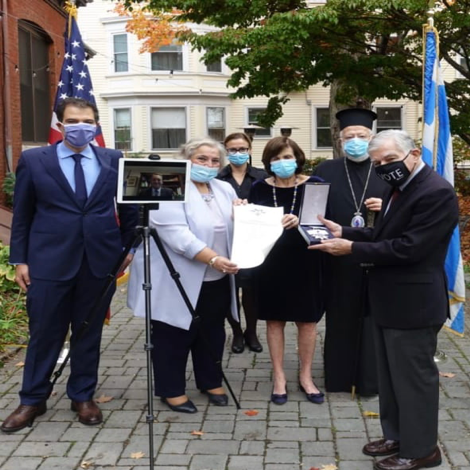
by Editor | Nov 1, 2020 | News
Greece honored Mike Dukakis with Order of Honor of the Grand Commander on Saturday October 24. The award ceremony took place in the yard of the home of Michael Dukakis in the town of Brookline, Massachusetts. Ambassador of Greece to the United States Alexandra Papadopoulou presented Michael Dukakis with the award on behalf of the President of the Hellenic Republic Katerina Sakellaropoulou.
Deputy Foreign Minister Kostas Vlassis participated in the ceremony via internet and in his speech he congratulated Dukakis on his services in political life and in the Greek-American community, as well as for his support of Greek National Issues. He also stressed that his overall career in U.S. public life, always keeping his eyes on Greece, was an example to be imitated and a source of inspiration for the younger generations of Greek-Americans, according to an announcement by the deputy minister’s office.
Dukakis is the longest-serving governor in Massachusetts history and was nominated by the Democratic Party for president in 1988. As a member of the Greek-American Community, he carried out important charitable, social and educational activities.
The original article can be read here.
Governor Michael Dukakis is a co-founder and the Chairman of the Boston Global Forum, AIWS.net, and AIWS City.
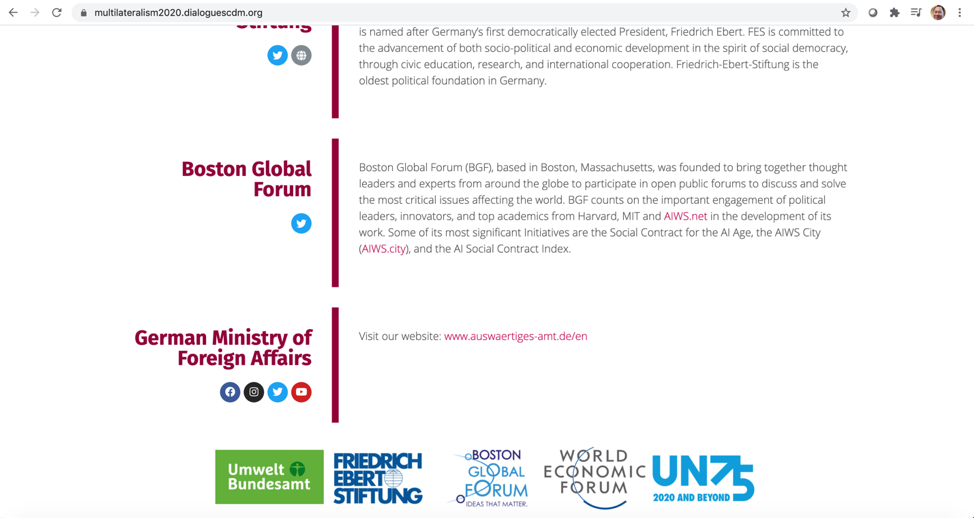
by Editor | Nov 1, 2020 | Event Updates
Leaders of AIWS City, including Professor Alex Sandy Pentland (MIT), Professor Nazli Choucri (MIT) and Mr. Nguyen Anh Tuan (Boston Global Forum), spoke at World Leadership Alliance – Club de Madrid (WLA-CdM) Policy Dialog October 28-30, 2020. The Boston Global Forum supported WLA-CdM Policy Dialog 2020, and the Call to Action below:
The world is again at a crossroad, confronted with a danger of sliding into a downward spiral of unbridled contest and power politics. But there is an alternative. We must seize this moment to set the world on a new path, a path that will end the assault threatening the foundations of our very existence, particularly that of the most vulnerable amongst us. We have to craft a path that will lead us to an equitable, secure and sustainable system of global cooperation and renewed multilateral institutions, fit for purpose in the 21st century and resilient against future disasters.
- Multilateral cooperation is not an option, it is essential to the preservation of our societal values and the resolution of transnational challenges related to peace and security; economic and financial stability and growth; ecological sustainability, digital transformation; trade; pandemics and others.
- Humankind is capable of transcending existing challenges building bridges, re-establishing trust and working actively and responsibly to manage systemic global risks and transnational challenges to protect the Global Commons.
- Multilateral institutions require increased participation, inclusion, local ownership and capacity of all, from those most impacted by global challenges on the ground to civil society, labor unions, the private sector, State and non-State actors, all the way to the Security Council.
- A forward-looking, viable and people-centered strategy of pragmatic dialogue,solidarity and trust are crucial for a reinvigorated, inclusive and effective multilateralism.
- We will advocate for the needed reforms constructively, decisively and persistently until the multilateral system is transformed into a more responsive framework fit for 21st century purpose.
The full Call to Action can be read here.
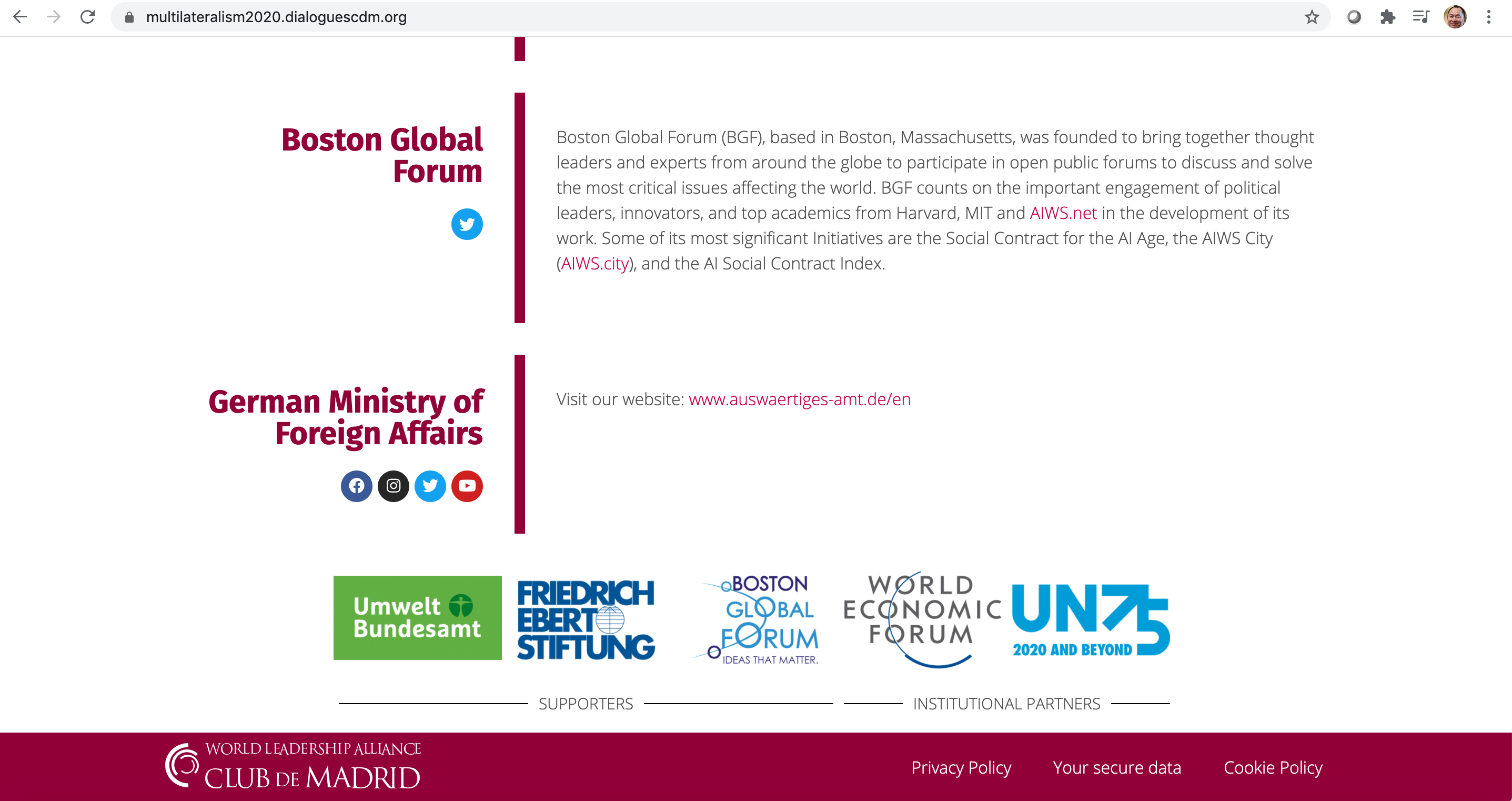
by Editor | Nov 1, 2020 | Publications
The WLA-CdM has published a Call to Action titled ‘Multilateralism must Deliver’ in response to current day global political situations. It can be read here.
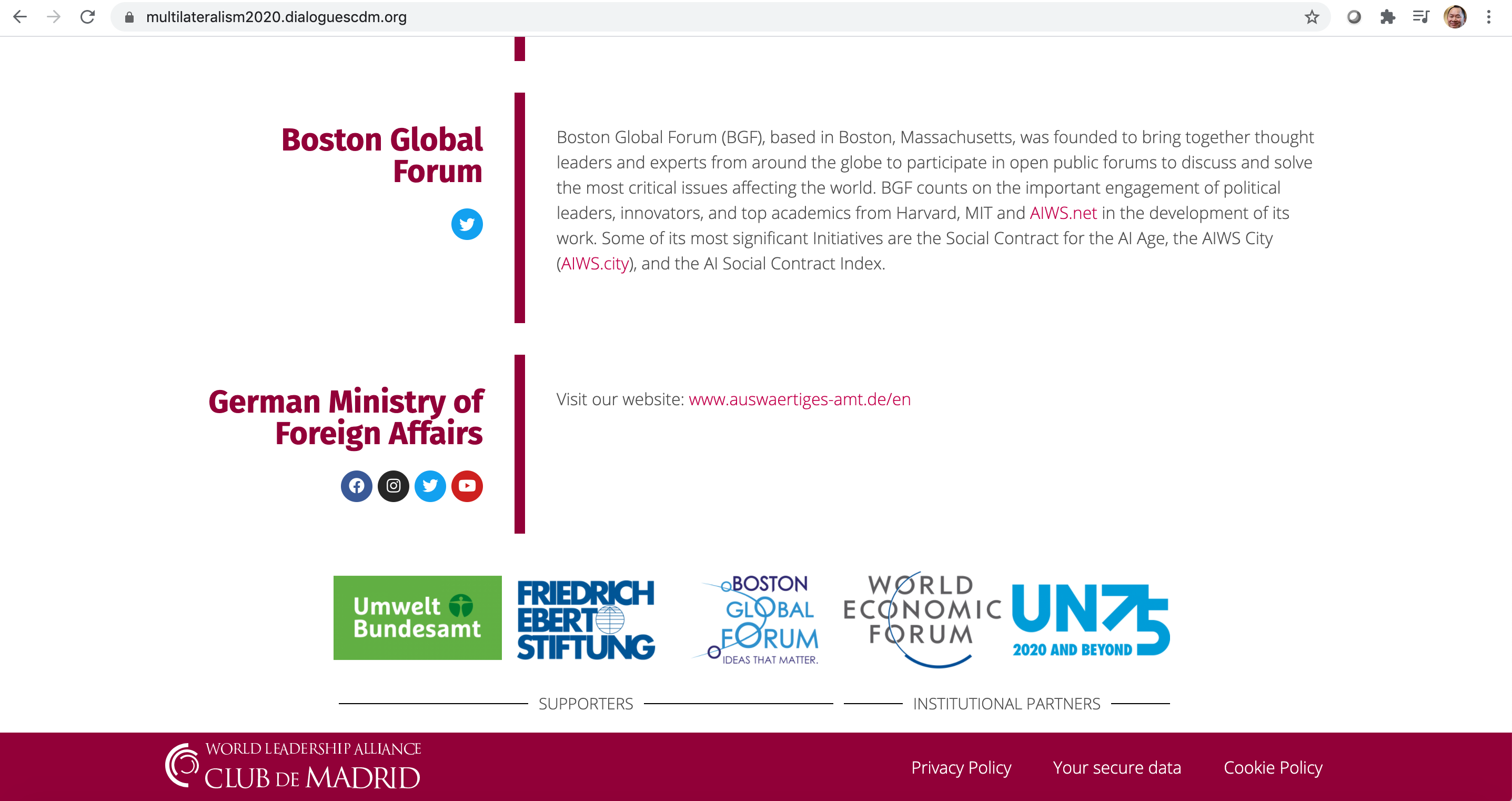
by Editor | Nov 1, 2020 | Publications
The World Leadership Alliance – Club de Madrid has released a press note, calling for action on multilateralism. It can be found here.
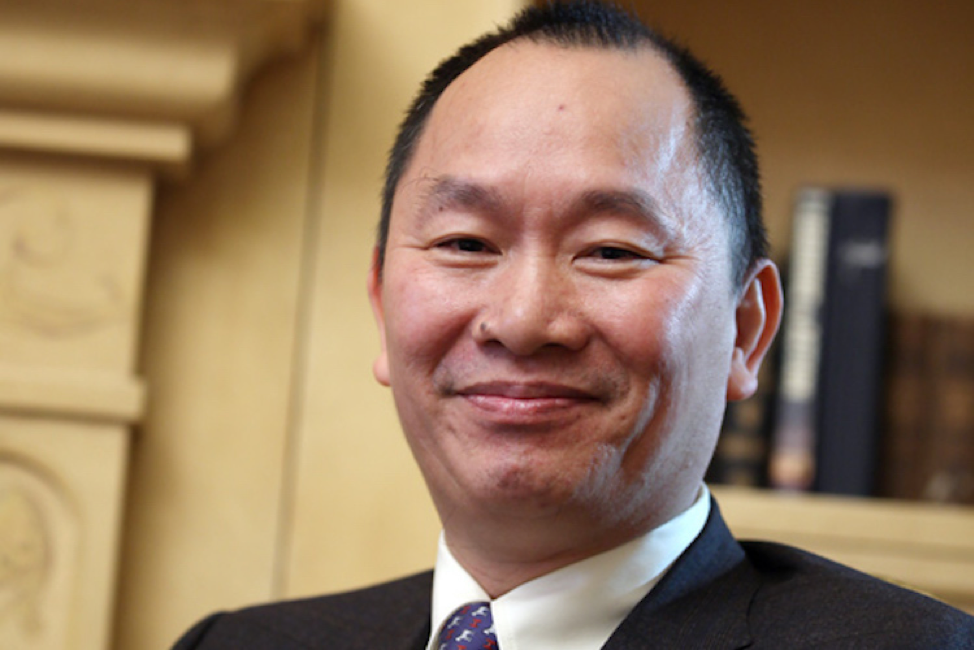
by Editor | Oct 25, 2020 | Global Alliance for Digital Governance, News
This is a reprint of an article originally published here.
BERLIN | NEW YORK (IDN) – People around the world are realizing that capitalism driven by Artificial Intelligence (AI) requires crafting a new sort of Social Contract, based on “stakeholder capitalism”, that is, capitalism that benefits everyone.
“Such capitalism cannot measure itself by money alone, but instead must encompass all aspects of human life, using metrics such as those developed to quantify the UN’s Sustainable Development Goals (SDGs),” says Alex Pentland, director of MIT Connection Science, an MIT-wide initiative. He previously helped create and direct the MIT Media Lab and the Media Lab Asia in India.
“Perhaps the greatest achievement of the SDGs that sustainability, as well as access to opportunity, education, and health now have quantitative metrics, agreed to by every nation on earth, that can be used to guide both enterprises and nations to a more sustainable, inclusive, fair, and lower risk future,” he writes in a contribution for the UN Academic Compact (UNAI).
“We cooperate with the United Nations Academic Impact through the United Nations 2045 Initiative,” said Nguyen Anh Tuan, CEO of the Boston Global Forum (BGF), Director of the Michael Dukakis Institute for Leadership and Innovation (MDI) and Co-Founder of the AI World Society Innovation Network (AIWS.net).
The United Nations 2045 initiative includes roundtables, ideas, concepts, solutions, essays, and reflections looking ahead to the global landscape in 2045, when the UN completes its first centenary, in areas of these technologies, including artificial intelligence, cybersecurity and weapons systems, among others.
“Such a compilation which looks both to the horizon ahead and the role of the United Nations in making it beneficial and secure would be timely,” Mr Tuan told IDN in an email interview.
He was speaking about the Virtual Policy Lab ‘Transatlantic Approaches on Digital Governance: A New Social Contract in the Age of Artificial Intelligence’ from September 16-18.
The World Leadership Alliance – Club de Madrid (WLA-CdM) in partnership with the Boston Global Forum (BGF) organised the Transatlantic and multi-stakeholder dialogue on global challenges and policy solutions in the context of the need to create a new Social Contract on digital technologies and AI.
“By comparing American and European approaches in the creation of a new Social Contract on AI and digital governance, under the critical eye of former democratic Heads of State or Government, this policy dialogue stimulated new thinking and brought out ideas from representatives of governments, academic institutions and think tanks, tech companies, and civil society, from both regions,” Mr Tuan said.
At the same time, he added, the discussion generated a space to encourage and strengthen Transatlantic cooperation on the new Social Contract of digital governance in the framework of needed reforms of the multilateral system and needed global responses to common problems such as the global health crisis of COVID-19. The dialogue also served as a platform to establish a Transatlantic Alliance for Digital Governance (DADG).
One of the panels was moderated by Mr Ramu Damodaran, Chief of the UN Academic Impact. Explaining the views of the panellists, Mr Tuan said the panellists agreed that DADG will use standards of the Social Contract for the AI Age to: support fundamental rights, the rule of law, and democratic institutions, especially in the aftermath of COVID-19; and maintain peace and security (including AI and cyberspace) in Alliance members, and around the world.
They also agreed to address challenges, threats, and perils from any countries in the world, including climate change, pandemics, cyberattack, harmful AI, extreme nationalism, totalitarianism, dictators, destruction natural resources, or others that violate the Social Contract for the AI Age, and create new models, methodologies, concepts, and initiatives to make a better and smarter world.
“This smarter world is a democratic one with deep-applied AI,” said Mr Tuan.
The Transatlantic Alliance on Digital Governance includes 1. Democratic governments; 2. Companies in democratic countries; and 3. Intellectual Societies.
Mr Tuan said they also talked about the Activities of Transatlantic Alliance on Digital Governance:
– Unite Inter-Parliamentary Alliance on China, Global Partnership on AI, World Leadership Alliance-Club de Madrid, OECD, Boston Global Forum, AIWS Innovation Network (AIWS.net) and top universities into an alliance
– “Democratic Alliance on Digital Governance”
– Discuss and decide strategies for a peaceful, safe, effective, and smart world.
– Maintain peace and security for the world.
– Maintain standards of the Social Contract for the AI Age in global business such as setting up and maintaining the Supply Chain 2020.
– Create international laws and accords based on standards of the Social Contract for the AI Age.
– Enforce international laws and accords.
– Create systems for Global Monitoring and Judging such as Global Courts and Global AI Citizen.
Below two further questions IDN asked Mr Tuan and his answers:
Question: Have the discussions paved the road to the creation of an initiative to monitor governments as well as companies in using AI and generate an AI Ethics Index at all levels?
Mr Tuan: Yes. We spoke about solutions to monitor AI developments and uses by governments, corporations, and to assess whether they comply with the norms and standards codified in the Social Contract for the AI Age. Noncompliant actors will be identified and publicized through fact-based reports.
We named the AI Ethics Index as the AI Social Contract Index, which is linked to the standards of Social Contract for the AI Age.
The AI Social Contract Index is a global survey that will allow policymakers and the public to assess progress toward trustworthy AI based on normative goals.
The AI Ethics Index has these objectives:
(1) to evaluate a country’s AI policies and practices in 2020,
(2) to compare the AI policies and practices of various countries in 2020, and
(3) to evaluate a country’s AI policies and practices over time.
The AI Ethics Index will focus on human rights, rule of law, and democratic governance metrics. Endorsement and implementation of the OECD AI Principles will be among the primary metrics.
Opportunities for the public to participate in the formation of national AI policy, as well as the creation of an independent, national commission to address AI challenges, will be included among the metrics. Patents, publications, and investment are important metrics for AI policies, but they will not be considered here. The AI Ethics Index will be published on an annual basis and will evolve as country practices change and new issues emerge.
The first edition of the AI Social Contract Index will examine policies and practices in the Top 25 countries by GDP and other high impact countries. These countries, ranked in order, are US, China, Japan, Germany, India, France, UK, Italy, Brazil, Canada, Russia, Korea, Spain, Australia, Mexico, Indonesia, Netherlands, Turkey, Saudi Arabia, Switzerland, Poland, Taiwan, Thailand, Sweden, Belgium. (Source: Statistics Times. “High impact” countries include Israel and Estonia.)
Question: How do American and European approaches compare with each other in the creation of a new Social Contract on AI and digital governance?
Mr Tuan: The Boston Global Forum integrates both sides of the Atlantic. We call for the maintenance and protection of democratic values. The Social Contract for the AI Age is a new Social Contract on AI and digital governance. It is not only AI and Digital, but also involves politics, economy and society. The Social Contract for the AI Age seeks to build a multi-stakeholder, inclusive society in all aspects of life across politics, government, economics, business, and industry.
The Social Contract for the AI Age values creation, innovation, philanthropy, and mutual respect. It seeks the right of freedom on, and access to, the Internet worldwide. The Social Contract for the AI Age seeks to make the world a locus of responsible interaction—a place where every person’s contribution is recognized and everyone has a right to knowledge and access to information, where no one is above the law, where money cannot be used to subvert political process, and where integrity, knowledge, creativity, honesty, and tolerance shape decisions and guide policy. In short, the Social Contract for the AI Age seeks to build a world where all are recognized and valued, and all forms of governance adhere to a set of values and are accountable and transparent. It is a world where global challenges are met by collective action and responsibility. [IDN-InDepthNews – 11 October 2020]

by Editor | Oct 25, 2020 | News
Vietnam is a beautiful country with 3,200 kilometers of shorelines and many natural beaches. Phan Thiet is a well-known city with blue ocean, white sands, bright sunshine, and modern infrastructure, connecting the region to cities around the world with an international airport, seaports, and highways.
Phan Thiet city is also famous for the unique culture and history of the Champa people. Phan Thiet is only 160 km from Ho Chi Minh city. Phan Thiet provides all the conditions to be a world destination.
With the available advantages of this city, Novaland Group has built a World’s Beach City for Wellness, an attractive destination for vacation called NovaWorld Phan Thiet.
NovaWorld Phan Thiet is a gem, an urban coastal city, a vacation land and a modern working city with all the requirements to become an ideal destination for world leaders, creators, innovators, and scholars.
As the founder and leader of Novaland during the last 28 years, I have been deeply thinking of how to make our Group’s services contribute to building a better society.
With this thinking and strategy in mind, Novaland has cooperated with Michael Dukakis Institute for Leadership and Innovation to create a NovaWorld Phan Thiet City with high international standards.
We are inspired by the vision and standards of a better, more humane, kinder world of the Social Contract for the AI Age and AIWS City set out at the World Leadership Alliance-Club de Madrid by Governor Michael Dukakis, President Vaira Vike- Freiberga, Prime Minister Zlatko Lagumdzija, Father of the Internet Vint Cerf, Professor Alex Sandy Pentland.
We are proud to cooperate with the AIWS City to create NovaWorld Phan Thiet, a city of history, intelligence, and humanity, connecting with other intellectual, cultural and innovative centers around the world, with the standards of the Social Contract in the AI Age, adhering to AIWS City.
It will become a model for a great ecosystem, vacation and working city for the 21st century, the artificial intelligence age with noble values.
NovaWorld Phan Thiet will be a model for sustainable development the 21st century.
NovaWorld Phan Thiet will be a place for residents and tourists to be inspired.
We wish this city to create a better world in this AI age. During this exciting journey, we wish to join with world leaders, World Leadership Alliance-Club de Madrid members, AI World Society Innovation Network (AIWS.net) leaders and AIWS City members.
We look forward to welcoming leaders, thinkers, creators and innovators to attend the World Leadership Alliance-Club de Madrid event in 2022 at NovaWorld Phan Thiet.
Bui Thanh Nhon, Founder and Chairman of the Novaland Group
Video: https://www.youtube.com/watch?v=UWUhuIlF4P0
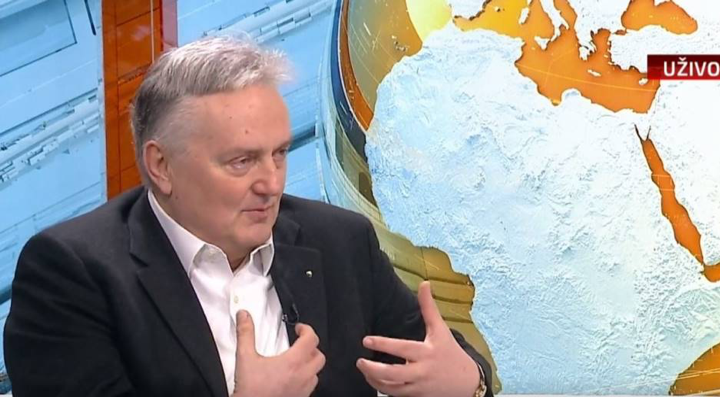
by Editor | Oct 24, 2020 | News
The United Nations 2045 Roundtable
United Nations 2045 Initiative – UNleashed 2045: The United Nations at 100
The AIWS City – a model for cities of 2045
Time: 11:00 am – 12:30 pm EDT, October 27, 2020
This is a United Nations 2045 Roundtable and an event of the History of AI
Keynote speaker:
Prime Minister Zlatko Lagumdzija, Board of Leaders, the AIWS City
Panelists:
Ambassador Swanee Hunt, Harvard Kennedy School
David Silbersweig, Professor of Harvard Medical School
Kazuo Yano, CEO of Happiness Planet, Japan
Roya Mahboob, CEO and Board Member of the Digital Citizen Fund
Moderator:
Ramu Damodaran, Chief of the United Nations Academic Impact
At 10:10 am, 10/10/2020, at Beacon Hill, Boston, MA, the Boston Global Forum launched the
website AIWS.city. AIWS City, an all-digital, virtual, intelligent, and innovative ecosystem for work – endowed with kindness and consideration, and anchored in intellect. The AIWS City will start to serve from 1/9/2021. Prime Minister Zlatko Lagumdzija will present and discuss the AIWS City – a model for cities of 2045 at the United Nations 2045 Roundtable.
Agenda:
- 11:00 AM: Opening Remarks, Ramu Damodaran
- Keynote speech: The AIWS City – a model for cities of 2045,
Prime Minister Zlatko Lagumdzija
- Discussion: Swanee Hunt, David Silbersweig, Kazuo Yano, Roya Mahboob
- Q&A, Moderator Ramu Damodaran
- 12:15 PM: Conclude, Ramu Damodaran
The United Nations 2045 Initiative:
The United Nations 2045 is an initiative of the United Nations Academic Impact with collaboration by the Boston Global Forum and AIWS.net.
The United Nations 2045 include roundtables, ideas, concepts, solutions, essays, and reflections looking ahead to the global landscape in 2045, when the United Nations completes its first centenary, in areas of these technologies, including artificial intelligence, cyber security and weapons systems, among others. Such a compilation which looks both to the horizon ahead and the role of the United Nations in making it beneficial and secure, would be timely.
The History of AI Initiative:
The History of AI research and explore historical achievements, events, and figures in AI.
The HAI Board is chaired by Governor Michael Dukakis, with Professor Nazli Choucri (MIT), Historian Le Minh Chien, President of Dalat University, Professor Caroline Jones, MIT, Prime Minister Zlatko Lagumdzija, Professor Ole Molvig (Vanderbilt University), Tuan Anh Nguyen (Michael Dukakis Institute), Professor Thomas Patterson (Harvard University), Professor Judea Pearl (UCLA), Professor Alex Pentland (MIT), Professor David Silbersweig (Harvard University), Professor Caroline Jones, MIT, and President Vaira Vike-Freiberga, Latvia as members.
The “The History of AI” Board will review and identify historical events, figures, and achievements in AI. After the HAI Board approve them, they will be made official historical events, figures, achievements in AI and posted on the AI Chronicle at AIWS.net. The HAI Board will review and select contents for books and papers of the History of AI.
Bios:
Keynote Speaker:
H.E. Zlatko Lagumdzija

- Former Prime Minister, Bosnia and Herzegovina
- Member of Board of Leaders, the AIWS City
- Member of the History of AI Board
Zlatko (Salko) Lagumdžija, born 26 December 1955 in Sarajevo is a Bosnian politician.
Lagumdzija graduated with a master’s degree and doctorate in computer science and electrical engineering at the University of Sarajevo. As a Fulbright scholar, he conducted post-doctoral research at the University of Arizona, Tucson, 1988-1989.
His professional career began in 1989 as Professor of Economics and Electrical Engineering at the University of Sarajevo. At the Faculty of Economics in 1994, he became head of the Department of Business Information, a year later, and director of the Center for Management and Information Technology.
Since 1998 member of the “Global Leaders for Tomorrow” by the World Economic Forum in Davos. Since 2004 he is member of the International Advisory Committee of the Congress of Democrats from the Islamic countries, and since 2005 he has been the Vice President of the Senate of the Bosnian Institute. Member of the World Academy of Arts and became in 2006 a member of the Club of Madrid (Association of Former Heads of State and Government) since 2005.
Lagumdzija served as the President of the Social Democratic Party (SDP) from 1997 until 2014. He has been a member of the party since 1992 and remains one today.
In the period from 1992 to 1993 Lagumdzija served as Deputy Prime Minister of the Republic of Bosnia and Herzegovina (BiH), and in 1993 he was the Prime Minister.
Lagumdzija has been a member of the House of Representatives of the Parliamentary Assembly of Bosnia and Herzegovina from 1996-present, with the only interruption in the mandate – from 2001 to 2002, when he was the Minister of Foreign Affairs and Chairman of the Council of Ministers.
He is married to his wife Amina they have two daughters Dina and Asja Zara and one son Zlatko Salko.
Moderator:
Ramu Damodaran

- Chief, the United Nations Academic Impact
Editor-in-Chief of the United Nations Chronicle Magazine
Mr. Ramu Damodaran is Deputy Director for Partnership and Public Engagement in the United Nations Department of Public Information’s Outreach Division and is chief of the United Nations Academic Impact initiative, which aligns institutions of higher learning and research with the objectives of the United Nations and the States and peoples who constitute it. He is also the current secretary of the United Nations Committee on Information. His earlier posts with the Organization have included the Departments of Peacekeeping and Special Political Questions, as well as the Executive Office of the Secretary-General.
Mr. Damodaran has been a member of the Indian Foreign Service, where he was promoted to the rank of Ambassador, and where he served as Executive Assistant to the Prime Minister of India as well as in the diplomatic missions in Moscow and to the United Nations, and in a range of national governmental ministries.
Panelists:
Ambassador Swanee Hunt

Swanee Hunt’s mission is to achieve gender parity, especially as a means to end war and rebuild societies, as well as to alleviate poverty and other human suffering. At Harvard’s Kennedy School of Government, Hunt is the Eleanor Roosevelt Lecturer in Public Policy. In 1997, she founded the Women and Public Policy Program, a research center concerned with domestic and foreign policy, which she directed for more than a decade. At the Kennedy School, she is also core faculty at the Center for Public Leadership and senior advisor to The Initiative to Stop Human Trafficking in the Carr Center for Human Rights. An expert on domestic policy and foreign affairs, Hunt also chairs the Washington-based Institute for Inclusive Security, conducting research, training, and advocacy to integrate women into peace processes. Her seminal work in this area began when, as the US Ambassador to Austria from 1993 to 1997.
Raised in a corporate family in Dallas, Texas, Hunt made her mark as a civic leader and philanthropist in her adopted city of Denver, where for two decades she led community efforts on issues such as public education, affordable housing, homelessness, women’s empowerment, and mental health services for two mayors and the governor of Colorado.
Hunt is also leading a national action plan to stem the rise in prostituted sex through a market model that addresses not the supply but the demand, using changes to legislation and law enforcement practice as levers for change. Hunt is a member of the Council on Foreign Relations; she has authored articles for Foreign Affairs, Foreign Policy Magazine, International Herald Tribune, Chicago Tribune, Boston Globe, Dallas Morning News, Huffington Post, et al.
Her first book, This Was Not Our War: Bosnian Women Reclaiming the Peace, won the 2005 PEN/New England Award for non-fiction. Her memoir, Half-Life of a Zealot, was published in 2006. Her third book with Duke University Press, Worlds Aparts: Bosnian Lessons for Global Security,came out in July 2011. She is currently writing Rwandan Women Rising. Hunt holds two master’s degrees, a doctorate in theology, and six honorary degrees. world of classical music. A composer and photographer, she is a trustee of the Free for All Concert Fund, building a $20 million endowment to ensure that all individuals in the Boston region will have regular and permanent access to the rich world of classical music.
She was married for 25 years to Charles Ansbacher, international conductor and founder of the Boston Landmarks Orchestra, and the Free for All Concert Fund. Her world includes their three children, and a menagerie of cat, parrot, horses, bison, and grandchildren.
David Silbersweig

- Co-founder of the AIWS Innovation Network
(AIWS.net)
- Board Member of Michael Dukakis Institute for Leadership and Innovation
- Professor of Harvard Medical School
Dr. David Silbersweig is a neurologist and psychiatrist, having trained in both psychiatry and neurology at The New York Presbyterian Hospital-Weill Cornell Medical Center Dr. He is now the Chairman of the Department of Psychiatry at the Brigham and Women’s/Faulkner Hospitals, and also Chairman of the Brigham and Women’s Hospital Institute for the Neurosciences. Dr. David Silberswei is Stanley Cobb Professor of Psychiatry at Harvard Medical School.
David Silbersweig graduated from Dartmouth College and Cornell University Medical College. At Cornell University, Dr. Silbersweig found and direct the Functional Neuroimaging Laboratory with Dr. Emily Stern; he was the Tobin-Cooper Professor of Psychiatry, Professor of Neurology and Neurosciences, and was Vice Chairman, for Research, in the Department of Psychiatry. Dr. Silbersweig was the founding Director of the Division of Neuropsychiatry, as well as the founding Director of the Neurology-Psychiatry Combined Residency Program. He is one of the pioneers of functional neuroimaging research in psychiatry. Along with his colleagues, they developed novel methods and paradigms for both PET and MRI imaging that are widely used, and have identified neural circuitry abnormalities associated with a number of major psychiatric disorders.
Kazuo Yano

* CEO of Happiness Planet
- Fellow of Hitachi
- Former Corporate Chief Scientist, Hitachi
- AIWS Distinguished Lecture 2019
Kazuo YANO, D.Eng. is currently a Fellow of Hitachi, Ltd. He is also the leader of the Happiness Project in the Future Investment Division.
Yano joined Hitachi as a researcher after receiving a M.Sc. from Waseda University, Tokyo, Japan in 1984. He is known as a pioneer for his early works in the area of semiconductors, such as complementary pass-transistor logic (CPL) and the world-first room-temperature single-electron memories.
In 2003, his research focus shifted to sensors and sensor networks, measuring and analyzing big data. His work on quantifying happiness from human big data has been applied to over 30 companies to raise the collective happiness level of employees in the workplace. Further, his work on multi-purpose artificial intelligence which has already been applied to over 60 cases in 14 domains, is raising great interest across industries.
Yano is also a Fellow of IEEE, a member of the Japan Society of Applied Physics, the Physical Society of Japan, the Japanese Society for Artificial Intelligence and the IEICE of Japan. His extensive work has been recognized through numerous awards including the including the 1994 IEEE Electron Devices Society Paul Rappaport Award, 1996 IEEE ISSCC Lewis Winner Award, 1998 IEEE ISSCC Jack Raper Award, 2007 MBE Erice Prize, Best Paper Award of International Conference on ASE/IEEE Social Informatics 2012. He has served on Technical Program Committee Members of IEDM, DAC, ASSCC, ASP-DAC, SPOTS and EmNet, as the Symposium Co-Chairman/Chairman for 2008/2009 Symposium on VLSI Circuits, and more recently as a member of the External Advisory Board to IEEE Spectrum, a member of Information Science and Technology Committee of the Ministry of Education, Culture, Sports, Science and Technology, in Japan.
He has also co-authored or authored books including “The Invisible Hand of Data” (Soshisha, 2014) which was described as one of top-10 business books in Japan in 2014 by BookVinegar and since then has been translated into Chinese, Korean and English. He has over 350 patent applications, and his papers have been cited in over 2500 papers.
Yano was a Visiting Scientist at the Arizona State University from 1991-1992. He received his D.Eng. in Physics from Waseda University in 1993. He is currently an Adjunct Professor at the Tokyo Institute of Technology.
Roya Mahboob

* TIME Magazine’s 100 Most Influential People in the World for 2013
- Michael Dukakis Leadership Fellow 2015
- CEO and Board Member of the Digital Citizen Fund
Roya is the CEO and Board Member of the Digital Citizen Fund, with aims to increase women’s technological literacy and provide employment and educational opportunities for girls and children in developing countries and sits on the Advisory Board of Forbes School of Business of Ashford University, Resolution Project, and the Global Thinkers Forum organization.
Roya was named to TIME Magazine’s 100 Most Influential People in the World for 2013 for her work in building internet classrooms in high schools in Afghanistan. The TIME 100 essay was written by Facebook COO, Sheryl Sandberg who is also the author of “Lean in Women, Work and the Will to Lead”. She is also a member of the 2014 Tribeca Disruptive Innovation Awards, Civic Innovators, The Advancement of Gender Equality through Education Award and Young Leader of World Economic Form in 2015.













